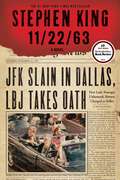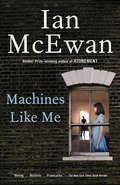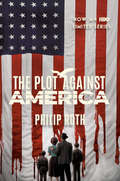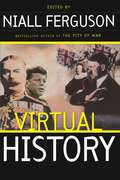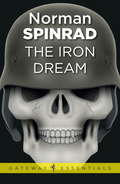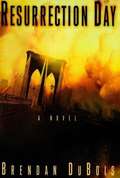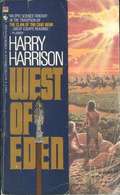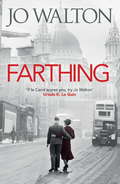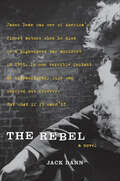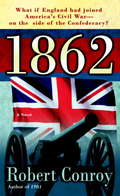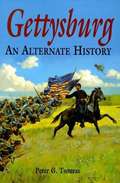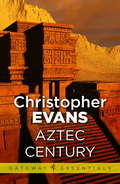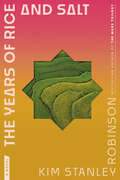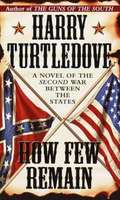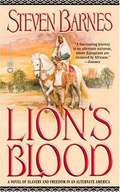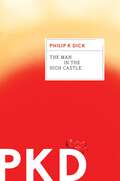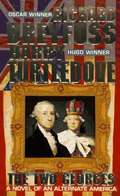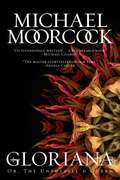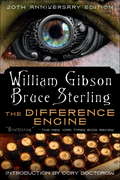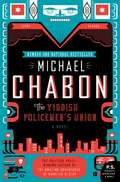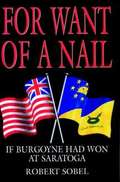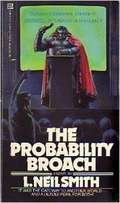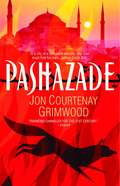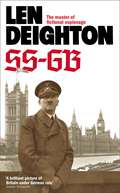Special Collections
Alternate History
- Table View
- List View
11/22/63
by Stephen KingTHE #1 NEW YORK TIMES BESTSELLER AND MODERN CLASSIC FROM MASTER STORYTELLER STEPHEN KING A NEW YORK TIMES BOOK REVIEW TOP TEN BOOK OF THE YEAR WINNER OF THE LOS ANGELES TIMES BOOK PRIZEOn November 22, 1963, three shots rang out in Dallas, President Kennedy died, and the world changed. What if you could change it back? In this brilliantly conceived tour de force, Stephen King—who has absorbed the social, political, and popular culture of his generation more imaginatively and thoroughly than any other writer—takes readers on an incredible journey into the past and the possibility of altering it.It begins with Jake Epping, a thirty-five-year-old English teacher in Lisbon Falls, Maine, whose life is upended when his friend Al, who owns the local diner, divulges a secret: his storeroom is a portal to the past, a particular day in 1958. And the dying Al enlists Jake to take over the mission that has become his obsession—to prevent the Kennedy assassination.So begins Jake&’s new life as George Amberson, in the world of Ike and JFK and Elvis, of big American cars and sock hops and cigarette smoke everywhere and to the small town of Jodie, Texas, where Jake falls dangerously in love. Every turn leads eventually to a troubled loner named Lee Harvey Oswald and to Dallas, where the past becomes heart-stoppingly suspenseful, and where history might not be history anymore. Time-travel has never been so believable. Or so terrifying.
Machines Like Me
by Ian McEwanNew from Ian McEwan, Booker Prize winner and international bestselling author of Atonement and The Children Act Machines Like Me takes place in an alternative 1980s London.
Charlie, drifting through life and dodging full-time employment, is in love with Miranda, a bright student who lives with a terrible secret.
When Charlie comes into money, he buys Adam, one of the first synthetic humans and—with Miranda's help—he designs Adam's personality. The near-perfect human that emerges is beautiful, strong, and clever. It isn't long before a love triangle soon forms, and these three beings confront a profound moral dilemma.
In his subversive new novel, Ian McEwan asks whether a machine can understand the human heart—or whether we are the ones who lack understanding.
A New York Times Bestseller
The Plot Against America
by Philip RothWhen the renowned aviation hero and rabid isolationist Charles A. Lindbergh defeated Franklin Roosevelt by a landslide in the 1940 presidential election, fear invaded every Jewish household in America. Not only had Lindbergh, in a nationwide radio address, publicly blamed the Jews for selfishly pushing America toward a pointless war with Nazi Germany, but upon taking office as the thirty-third president of the United States, he negotiated a cordial "understanding" with Adolf Hitler, whose conquest of Europe and virulent anti-Semitic policies he appeared to accept without difficulty. What then followed in America is the historical setting for this startling new book by Pulitzer Prize-winner Philip Roth, who recounts what it was like for his Newark family -- and for a million such families all over the country -- during the menacing years of the Lindbergh presidency, when American citizens who happened to be Jews had every reason to expect the worst.
Virtual History
by Niall FergusonSpeculative history at its best, in which a talented team of historians, led by Niall Ferguson, explore what might have happened if nine momentous events had turned out differently.
The Iron Dream
by Norman SpinradThe Iron Dream is a metafictional 1972 alternate history novel by Norman Spinrad. The book has a nested narrative that tells a story within a story. On the surface, the novel presents an unexceptional science fiction action tale entitled Lord of the Swastika. This is a pro-fascist narrative written by an alternate history version of Adolf Hitler, who in this timeline emigrated from Germany to America and used his modest artistic skills to become first a pulp-SF illustrator and later a science fiction writer in the L. Ron Hubbard mold (telling lurid, purple-prosed adventure stories under a thin SF-veneer). Spinrad seems intent on demonstrating just how close Joseph Campbell's Hero with a Thousand Faces-and much science fiction and fantasy literature- an be to the racist fantasies of Nazi Germany. The nested narrative is followed by a faux scholarly analysis by a fictional literary critic, Homer Whipple, of New York University.
Resurrection Day
by Brendan DuboisIt's October 1972, 10 years since the Cuban missile crisis erupted into a full-blown nuclear war between the US and the USSR. The USSR is decimated, and the US is a shell of her former self...
Farthing
by Jo WaltonEight years after they overthrew Churchill and led Britain into a separate peace with Hitler, the upper-crust families of the ?Farthing set? are gathered for a weekend retreat. Among them is estranged Farthing scion Lucy Kahn, who can't understand why her and her husband David's presence was so forcefully requested. Then the country-house idyll is interrupted when the eminent Sir James Thirkie is found murdered - with a yellow Star of David pinned to his chest.Lucy begins to realize that her Jewish husband is about to be framed for the crime - an outcome that would be convenient for altogether too many of the various political machinations underway in Parliament in the coming week. But whoever's behind the murder, and the frame-up, didn't reckon on the principal investigator from Scotland Yard being a man with very private reasons for sympathizing with outcasts and underdogs - and prone to look beyond the obvious as a result.As the trap slowly shuts on Lucy and David, they begin to see a way out - a way fraught with peril in a darkening world.
The Rebel
by Jack DannWith The Rebel, acclaimed award-winning author Jack Dann pulls James Dean from the twisted wreckage and offers him a second chance to make an indelible mark on his art, his culture, and his time in an era of profound change and devastating social upheaval.Surviving the horrific crash that leaves him permanently scarred, both physically and emotionally, the haunted, brooding, and complex young star finds himself charged with a feeling of responsibility to do "something wonderful and important." Yet for Jimmy Dean, the glory road will be winding and broken, littered with the detritus of exploded dreams and destroyed love, as it passes through the holiest cultural sites of postwar twentieth-century America -- the genius-and-drug pumped world of the Beats, the protected inner sanctum of Graceland, the darkest shadows of Camelot. The lives and futures of Kerouac, Sinatra, Elvis, and the Kennedys will all be touched by him -- yet perhaps none so deeply as the fragile sex goddess who will always be his greatest burden and true soul mate, a dazzling and tragically lost phenomenon named Marilyn -- as he moves toward an astonishing destiny that will reconfigure the world.Ingeniously blending historical fact with brilliant invention, The Rebel is a hip, fast, and mesmerizing ride through the fifties and sixties -- an unforgettable road trip across a nation with an American legend at the wheel.
1862
by Robert ConroyThe Civil War comes alive in all its passion and fury, only now the Brits are fighting alongside the Confederacy. Outraged when the U.S. Navy seizes three Confederates aboard an English sailing ship, Britain retaliates by entering the fray in support of the Rebels and suddenly it's a whole new war. Once again, cotton is king as the North's blockade crumbles before the might of the Royal Navy. While Lincoln confronts the monumental challenge of vanquishing mighty Britannia, the Redcoats revive their 1812 penchant for burning down American cities, and Union troops see Canada as ripe for the picking. From the Mississippi bayou to the Pennsylvania farmlands to the woods of Maine, the great armies of Generals Grant and Lee face off in the nation's deadliest conflict. And to the victor goes history.
Gettysburg
by Peter G. TsourasThe author has written an account of the Battle of Gettysburg as though some of the "What Ifs" had hapened. What if J.E.B. Stewart had arrived in time to be in the second day's fighting?, et. cet.
Aztec Century
by Christopher EvansBritain has fallen to the technological might of the Aztec Empire whose armies have rampaged across the globe. Now, for the first time in a millennium, the British are a subject race. Inevitably there is resistance - and among those determined to fight the invaders is Princess Catherine, elder daughter of the British monarch. But she is torn between her patriotism and her growing involvement, political and personal, with the Aztecs - and with one Aztec in particular. Then her sister is arrested and exiled for her part in an alleged terrorist attack - and Catherine finds herself walking a perilous tightrope... Sweeping from occupied Britain to the horrors of the Russian front and the savage splendour of the imperial capital in Mexico, Aztec Century is a magnificent novel of war, politics, intrigue and romance, set in a world that is both familiar - and terrifyingly alien.Winner of the BSFA Award for best novel, 1993
The Years of Rice and Salt
by Kim Stanley RobinsonWith the incomparable vision and breathtaking detail that brought his now-classic Mars trilogy to vivid life, bestselling author KIM STANLEY ROBINSON boldly imagines an alternate history of the last seven hundred years. In his grandest work yet, the acclaimed storyteller constructs a world vastly different from the one we know. The Years of Rice and Salt: It is the fourteenth century and one of the most apocalyptic events in human history is set to occur--the coming of the Black Death.
How Few Remain
by Harry TurtledoveFrom the master of alternate history comes an epic of the Second Civil War. It was an epoch of glory and success, of disaster and despair. Twenty years after the South won the Civil War, America writhed once more in the bloody throes of battle. Furious over the annexation of key Mexican territory, the United States declared total war against the Confederate States of America. And so, in 1883, the fragile peace was shattered.But this was a new kind of war, fought on a lawless frontier where the blue and gray battled not only each other, but the Apache, the outlaw, and even the redcoat. Along with France, England entered the fray on the side of the South, with blockades and invasions from Canada. Out of this tragic struggle emerged figures great and small. The disgraced Abraham Lincoln crisscrossed the nation championing socialist ideals. Confederate cavalry leader Jeb Stuart sought to prevent wholesale slaughter in the desert Southwest, while cocky young Theodore Roosevelt and stodgy George Custer bickered over modern weapons--even as they drove the British back into western Canada.Thanks to the efforts of journalists like Samuel Clemens, the nation witnessed the clash of human dreams and passions. Confederate genius Stonewall Jackson again soared to the heights of military expertise, while the North's McClellan proved sadly undeserving of his once shining reputation as the "young Napoleon." For in the Second War Between the States, the times, the stakes, and the battle lines had changed . . . and so would history.Once again, Harry Turtledove has created a thoroughly engrossing alternate history novel, a profoundly original epic of blood and honor, courage and sacrifice, set amidst the raw beauty of young America's frontier wilderness.From the Hardcover edition.
Lion's Blood
by Steven BarnesA brilliant saga of a slave plantation in the old South, the African-ruled South.
The Man in the High Castle
by Philip K. DickIt's America in 1962. Slavery is legal once again. The few Jews who still survive hide under assumed names.
In San Francisco, the I Ching is as common as the Yellow Pages. All because some twenty years earlier the United States lost a war--and is now occupied by Nazi Germany and Japan.
This harrowing, Hugo Award-winning novel is the work that established Philip K. Dick as an innovator in science fiction while breaking the barrier between science fiction and the serious novel of ideas.
In it Dick offers a haunting vision of history as a nightmare from which it may just be possible to wake.
Winner of the Hugo Award
The Two Georges
by Richard Dreyfuss and Harry TurtledoveOscar-winning actor Richard Dreyfuss and Hugo Award-winning author Harry Turtledove offer a rollicking story of murder, intrigue, and a stolen painting in America the way it might have been, had George Washington surrendered to George III.
Gloriana
by Michael MoorcockIn this "spellbinding" (The Sunday Times) award-winning fantasy, the vast empire of Albion is ruled by the beautiful and forlorn queen, Gloriana, who must battle against a nefarious scoundrel, Captain Quire, and a court soured by debauchery with her wits.First published in 1978, Gloriana is the award-winning story set in the alternate English kingdom of Albion that reimagines Queen Elizabeth's reign. Bawdy, cruel, and brilliant, Gloriana has been awarded the World Fantasy Award and the John W. Campbell Memorial Award for Best Science Fiction, and is often cited as one of the great works of speculative fiction and fantasy along the lines of J.G. Ballard, Thomas Pynchon, and Philip K. Dick.
The Difference Engine
by Bruce Sterling and William Gibson1855: The Industrial Revolution is in full and inexorable swing, powered by steam-driven cybernetic Engines. Charles Babbage perfects his Analytical Engine and the computer age arrives a century ahead of its time. And three extraordinary characters race toward a rendezvous with history--and the future: Sybil Gerard--a fallen woman, politician's tart, daughter of a Luddite agitator Edward "Leviathan" Mallory--explorer and paleontologist Laurence Oliphant--diplomat, mystic, and spy. Their adventure begins with the discovery of a box of punched Engine cards of unknown origin and purpose. Cards someone wants badly enough to kill for.... Part detective story, part historical thriller, The Difference Engine is the collaborative masterpiece by two of the most acclaimed science fiction authors writing today. Provocative, compelling, intensely imagined, it is a startling extension of Gibson's and Sterling's unique visions--and the beginning of movement we know today as "steampunk!"From the Paperback edition.
The Yiddish Policemen's Union
by Michael ChabonFor sixty years Jewish refugees and their descendants have prospered in the Federal District of Sitka, a "temporary" safe haven created in the wake of the Holocaust and the shocking 1948 collapse of the fledgling state of Israel. The Jews of the Sitka District have created their own little world in the Alaskan panhandle, a vibrant and complex frontier city that moves to the music of Yiddish. But now the District is set to revert to Alaskan control, and their dream is coming to an end. Homicide detective Meyer Landsman of the District Police has enough problems without worrying about the upcoming Reversion. His life is a shambles, his marriage a wreck, his career a disaster. And in the cheap hotel where Landsman has washed up, someone has just committed a murder--right under his nose. When he begins to investigate the killing of his neighbor, a former chess prodigy, word comes down from on high that the case is to be dropped immediately, and Landsman finds himself contending with all the powerful forces of faith, obsession, evil, and salvation that are his heritage.At once a gripping whodunit, a love story, and an exploration of the mysteries of exile and redemption, The Yiddish Policemen's Union is a novel only Michael Chabon could have written.
For Want of a Nail
by Robert SobelFor Want of a Nail is an alternate history classic. The outcome of one battle in the American Revolution diverges from reality, and sparks an unstoppable chain of events which affects the history of the whole North American continent.
The Gate of Worlds
by Robert SilverbergDan Beauchamp, a young man from London, or as it's better known, New Istanbul, sails across the Atlantic to the land of opportunity, the Aztec Empire which stretches across the continent.
The Probability Broach
by L. Neil SmithDenver detective Edward William "Win" Bear, on the trail of a murderer, discovers much more than a killer. He accidentally stumbles upon the probability broach, a portal to a myriad of worlds--some wildly different from, others disconcertingly similar to our own. Win finds himself transported to an alternate Earth where what little government there is is called the North American Confederacy, where Congress is in Colorado, everyone carries a gun, there are gorillas in the Senate, and public services are controlled by private businesses. The followers of Albert Galatin want to keep it that way, but those of Alexander Hamilton want it otherwise. Somehow Win Bear has stumbled into the middle of this conflict and must protect that most precious right of all, his survival.
Pashazade
by Jon Courtenay GrimwoodPart mystery, part speculative fiction, and wholly unforgettable, Jon Courtenay Grimwood’s celebrated Arabesk series portrays the dark, hard-boiled story of a man out to prove his innocence in an alternate world where the facts aren’t always the same as the truth ... and murder isn’t the worst that can happen. It’s a twenty-first century hauntingly familiar and yet startlingly different from our own. Here the United States brokered a deal that ended World War I, and the Ottoman Empire never collapsed. And lording it over all sits the complex, seductive, and bloodthirsty North African metropolis of El Iskandryia. Almost nothing is what it seems to be in El Isk, and Ashraf Bey is no exception. Neither the rich Ottoman aristocrat everyone thinks he is, nor the minor street criminal once shipped off to prison when he fell foul of his Chinese Triad employers–the fact is that Raf has as little idea who he is as anyone else. With few clues and no money, all Raf has is a surname hinting at noble heritage and an arranged marriage to a woman who hates him. But nothing Ashraf al Mansur learns about himself is as unexpected—-or as terrifying—-as the brutal murder he’s accused of committing. Now, as a hunted man with the welfare of a precocious young girl in his irresponsible hands, Raf must race after a killer through an unforgiving city as foreign to him as the truth he'll uncover about himself.
